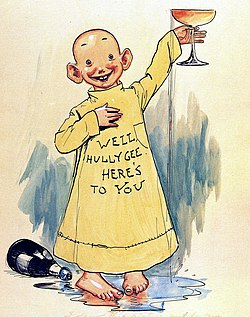Journalism
| You gotta spin it to win it Media |
| Stop the presses! |
| We want pictures of Spider-Man! |
| Extra! Extra! |
“”A journalist’s job is to accumulate sources, friends, and potential ex-lovers.
|
| —Anonymous intern[1] |
Journalism is an aspect of writing or type of media presentation that attempts to focus on bringing reported facts to the audience.
Traditionally, unlike "editorials" or "commentary," bias in journalism is not generally overt, though it is still present. However, especially with the variety of information sources available, journalists have become an open part of entertainment, propaganda, opinion formations, and change — for "good" and for "bad."
Journalists and sources[edit]
For important reasons, journalists generally hold a unique status in courtrooms. Unlike doctors and lawyers, they are protected from discussing sources by legal privileges (Journalism source protection![]() ). Journalists traditionally have been given slightly more leeway to keep a source anonymous than the average witness at a trial, based on the argument that they would otherwise never be able to get sources to talk. There is also a long tradition of journalists willing to be in contempt of court to protect sources (this does happen and isn't restricted to legal dramas on TV).
). Journalists traditionally have been given slightly more leeway to keep a source anonymous than the average witness at a trial, based on the argument that they would otherwise never be able to get sources to talk. There is also a long tradition of journalists willing to be in contempt of court to protect sources (this does happen and isn't restricted to legal dramas on TV).
Yellow journalism[edit]
So-called urine yellow journalism is the tendency for journalists to sensationalize an event for the sake of either sale of the individual article to a news source, or for the news source to sell to the populace. The term 'yellow journalism' applies equally to those overly glorified or gorified individual stories within a particular media outlet (newspaper, television show, or magazine) as well as to particular media outlets whose entire presentation consists of yellow journalism, such as the National Enquirer.
Joseph Pulitzer, publisher of the New York World, and William Randolph Hearst, editor of the New York Journal, founded the grand tradition of modern yellow journalism.
"Infotainment"[edit]
“”Some people think the media business is tough, but think of it like teaching preschool. There's a whole range of strategies, but one of them, guaranteed to work, is walking into class every morning and handing out giant tubs of ice cream. The Fox lineup is the media equivalent of this: a giant pile of tits, explosions and football.
|
| —Matt Taibbi[2] |
In the 1980s, a new breed of journalism started creeping into the United States media, with the trend quickly spreading to other countries and to their own journalists. USA Today was perhaps one of the first/best newspapers for creating this "happy news". The intent was ratings, at all costs. Stories were stripped down to the smallest bits of necessary information, bold energetic colors and headlines won the reader over, and editorials started to be far less "intellectually" bent, and far more "show me the money" writing.
Over the next 20 years in the United States, infotainment channels began to pop-up, blurring the distinction between 'true journalism' that has at its core the idea of presenting "truth," and the new aspects of infotainment, marketing. Gimmicky shows, hosts that aggressively called people out to embarrass them, so-called "loudmouths without college degrees" who used their pulpit just to be heard became common forms of infotainment.
At its height, Fox News became the first TV network to ignore its purpose of being news at all, and became an admitted loudspeaker for one political party and for the White House (well… whenever their man is in the White House). Truth no longer mattered at all, and the entertainment value was used to "sell" only one side.
See also[edit]
- The newspapers and broadcasters we have articles on
- Betteridge's law of headlines
- Fake news
- Penultimate paragraph syndrome
External link[edit]
- Media Law for Canadian Journalists, Dean Jobb (Obviously from a Canuck perspective, but a good read for anyone who wants to understand the intricacies of modern-day journalism.)
- Society of Professional Journalists: Code of Ethics
- Resolution 2066 (2015): Media responsibility and ethics in a changing media environment — Parliamentary Assembly, Council of Europe
- See the Wikipedia article on Journalism ethics and standards.
References[edit]
- ↑ Overheard in the Newsroom
- ↑ Taibbi, "Rupert Murdoch is Deviant Scum", Rolling Stone.
